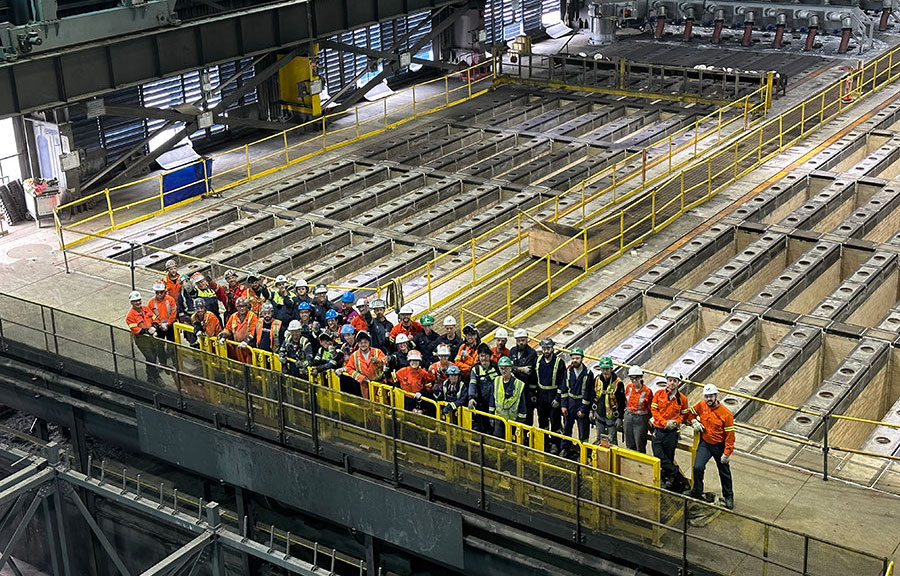Aluminerie Alouette, based in Sept-Îles, Quebec, Canada, is investing in its aluminum smelting operations. These investments include upgrades to its anode baking furnaces and the planned installation of new potline technologies to address waste streams at the site.
Established in 1992, Alouette is an independent aluminum producer. With over 850 employees and an annual production capacity exceeding 620,000 tonnes of primary aluminum, the company is the largest private employer in Sept-Îles and the largest aluminum smelter in the Americas. Sustainable development and innovation are at the core of the Sept-Îles facility’s operations.
Anode Baking Furnace Upgrades
Alouette restarted the first firing ramps of its No. 1 (ABF-1) anode baking furnace after a refractory relining project, which was completed with EPCM support from Hatch. “We are committed to maintaining our position as a leader in the aluminum industry, and this investment is an important component of that strategy,” noted Claude Gosselin, CEO of Alouette. “Hatch’s team, with its experience and expertise, contributed to make this phase of the project a success.”

Work on the reline of ABF-1 began earlier this year. The project involves the implementation of a new furnace technology that will allow for an increase in the furnace’s efficiency and operation. With the refractory installation nearly completed, the restart of their baking operations marks the next phase of this project. The refractory materials are designed to withstand the extreme heat and frequent thermal cycles typical of an anode bake furnace.
With furnace No. 1 restarted, the companies are now beginning work on the restart of a second furnace reline (ABF-2), which is expected to be completed in 2024. This work on ABF-1 and ABF-2 will ensure that Alouette will be able to continue to efficiently produce aluminum, decrease its carbon footprint, and accommodate future growth.
“We are pleased to partner with Alouette on this important project,” said Joe Lombard, global managing director of Metals at Hatch. “Our expertise in furnace relines and refractory materials is critical to the success of this project, and we look forward to helping Alouette increase the efficiency and reliability of its operations.”
New Potline Technologies
Alouette signed two contracts totaling $2.7 million with PyroGenesis Canada Inc. Both contracts will valorize new technologies aimed at addressing residue streams from the primary aluminum production process — including spent pot lining (SPL) and excess electrolytic bath.
The project includes funding contributions from both Alouette and the Centre québécois de recherche et de développement de l’aluminium (CQRDA), a Canadian organization that administers funding and programs made available by the provincial government’s Ministry of the Economy, Innovation and Energy for Quebec’s aluminum industry.
“We are very proud to be partnering, once again, with Alouette, a company renowned for its environmentally friendly practices and which operates the largest aluminum smelter in the Americas,” said P. Peter Pascali, CEO of PyroGenesis. “PyroGenesis’ technology and engineering capabilities will help re-use residues from aluminum production, including spent pot lining and electrolytic bath, thus helping Alouette advance its decarbonization strategy. These are the types of projects that underscore PyroGenesis’ strategy to position its processes to enable sustainable and environmentally responsible practices within the aluminum industry.”
The first contract will address the treatment of spent pot lining (SPL) waste. The lining of the pots used in the aluminum smelting process typically has an average lifespan of five years. When the SPL is removed and replaced within the pot, the residue is classified as a hazardous material, because it is contaminated with chemical compounds. An estimated 1.5 million tons of SPL are produced annually worldwide, making it a serious issue for the aluminum industry.
While dangerous, SPL contains valuable materials that, if processed correctly, could be recovered and reused. Under this contract, the companies will conduct a project focused on the development of a new process for processing SPL in a safe and environmentally friendly manner.
The technology proposed by PyroGenesis will use plasma arc thermal treatment to transform the carbonaceous and refractory materials contained in SPL into synthesis gas and aluminum fluoride — an important raw material that could be reused by Alouette in their production process. Compared with the chemical treatment currently used, this alternative method should enable significant savings by reducing or eliminating existing costs associated with various steps of processing and management of SPL, as well as addressing a major environmental issue for the aluminum industry in Quebec and elsewhere.
The second contract will address the challenge of excess electrolytic bath, which is produced in the pots during normal operation. These residues, also known in industry as “pure bath” or just “bath” can often be considered as hazardous material because of their high content in fluorine. The objective of the project is to process these materials in a plasma arc thermal treatment plant with the goal of producing aluminum fluoride ( a common element in both projects).
After significant progress made on the development by PyroGenesis, these two projects are now moving forward with the design and fabrication of the integrated thermal plasma furnace and gas purification system. Various lab-scale tests and experimental activities for gas conversion are taking place concurrently.
Subsequent phases of the projects will include further testing of the integrated system, and the eventual design of both pre-commercial and commercial scale (full industrial) systems at the Alouette site. Both projects have a commercial end goal, with a strategy to market the solutions industry-wide in conjunction with Alouette.
